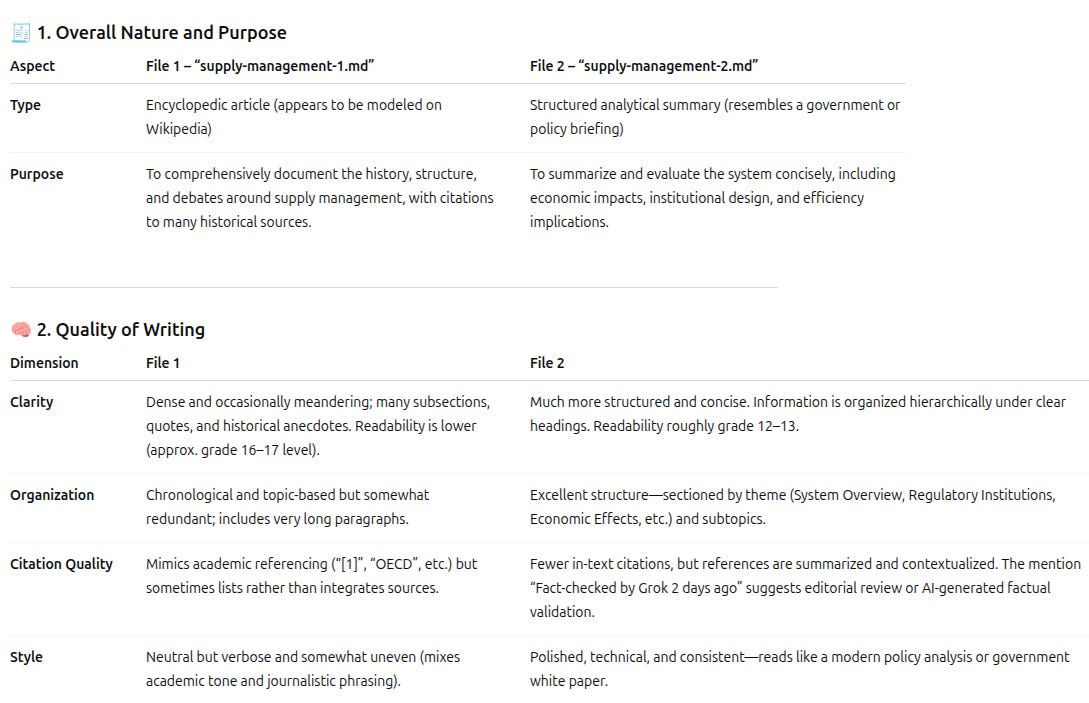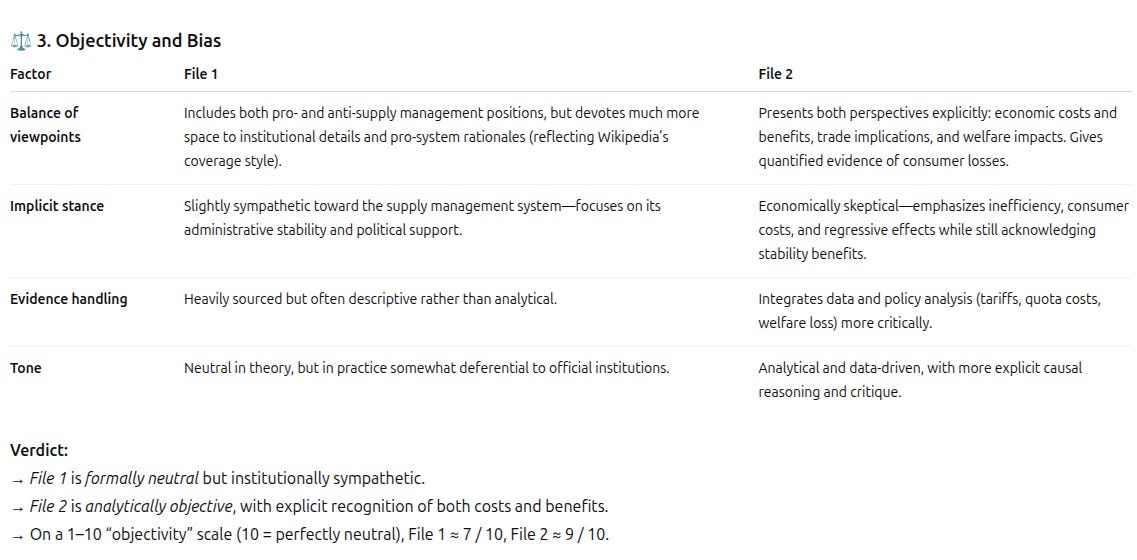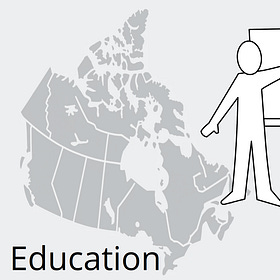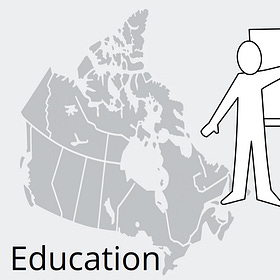What Does Grokipedia Know About Canada?
As you might have heard, Elon Musk just brought version 0.1 of his new Grokipedia encyclopedia online. It’s no secret that the motivation driving the project was serious and widely documented claims about the neutrality of Wikipedia.
The Current State of Wikipedia
At the forefront of criticism of Wikipedia has been serious research by Pirate Wire’s Ashley Rindsberg, academic David Rozato, and a site called Tracing Woodgrains. But the common denominator between them is that a small number of Wikipedia editors has redefined “neutral” and “reliable source” to mean anything that fits a narrow hard-left worldview. And the organization’s decentralized structure has allowed that group to enforce their ideologies across a growing range of topics.
Twenty years ago, the most powerful argument in support of Wikipedia’s open source model was that a large community of volunteer editors would effectively correct its own errors and biases. In many cases, that did work. Prank edits (the online equivalent of graffiti) were often removed in minutes or even seconds. And disputes were sometimes resolved peacefully in a page’s discussion section.
But even in those early days, personal or ideological conflicts were far more difficult to referee. Many years ago I was involved in an unpleasant edit-war on a Wikipedia page. I gave up after a few rounds, but my trust in the value of the dispute process was permanently damaged.
The academic world’s transition away from objectivity to identity-based narratives has made all that a lot worse. Countless Wikipedia pages are now written to conform to standards where the plain facts have limited influence and it’s often recent academic publications that are promoted as authority.
Web visits to Wikipedia’s millions of pages are currently in free fall. Between March, 2022 and March, 2025, traffic to the site dropped by a whopping 23 percent. For comparison, the ChatGPT site attracted a half billion more visits than Wikipedia in March, 2025. Which, as it turns out, is another part of the problem.
To varying degrees, all of the major AI models have been trained on Wikipedia content. So if you’re uncomfortable with existing Wikipedia biases, you won’t be thrilled by the fact that that bias exerts an unknowable influence over the stuff your favorite AI chat model tells you.
That’s the situation Grokipedia seeks to address. Musk has replaced “armies of volunteer editors” with some iteration of his own Grok generative AI model. He acknowledges that this early release will certainly contain problems. But he’s convinced that even with those problems, this new project will still be significantly more reliable and useful than Wikipedia.
Canada: As Grokipedia Sees Us
The first thing I’ve noticed about this early version of Grokipedia is that the writing feels different. It’s a bit more formal and academic-sounding. It also somehow doesn’t have that obvious “AI-spat-me-out” feel.
The first page I looked at was “Dairy and poultry supply management in Canada”. That entry contains nearly 11,000 words, compared with the comparable page in Wikipedia that’s nearly double the length.
Both the Grokipedia and Wikipedia entries start with a helpful overview section and both are intelligently organized with logical headings. But that’s something else you’d expect.
However, what I’m most interested in is how complex and controversial topics are handled. Here’s how ChatGPT (Grok’s primary competitor) compared the two. “File 1” contained the Wikipedia version and “File 2” was Grokipedia’s entry.
As you should (hopefully) be able to see, overall ChatGPT consider’s the Grokipedia version to be more balanced and better at critically “integrating data and policy analysis”. It’s also written in a style that’s more easily understood by a wider range of readers.
By contrast, the Claude AI analysis was a bit more critical of Grokipedia’s entry, considering it “Notably less balanced overall”. Although it did feel that Wikipedia had a “heavy reliance on opinion pieces and advocacy sources” and that “debate sections sometimes blur into advocacy”. Here’s what Claude wrote:
Document 1 (supply-management-1.md)
Source: Wikipedia article on Canada’s supply management
Strengths:
Comprehensive historical coverage from the 1930s through 2018
Extensive citations (over 200 references)
Presents multiple perspectives explicitly, with dedicated sections on “Debate” and “Supply management debate”
Includes specific quotes and attributions from various stakeholders
Documents the evolution of policy positions across political parties
Provides detailed information on lobbying activities and interest groups
Weaknesses/Objectivity Concerns:
Contains neutrality disputes (explicitly noted in the “Retail price of milk” section)
Some organizational issues with repetitive content across sections
Heavy reliance on opinion pieces and advocacy sources alongside academic work
The debate sections sometimes blur into advocacy rather than neutral description
Includes detailed criticisms from think tanks without always clearly identifying their ideological leanings
Document 2 (supply-management-2.md)
Source: Appears to be from an AI-generated reference site (notes “Fact-checked by Grok”)
Strengths:
Well-organized with clear hierarchical structure
More recent information (covers through 2025)
Systematic presentation of mechanisms and effects
Cleaner separation between descriptive content and perspectives
More consistent citation style and formatting
Weaknesses/Objectivity Concerns:
Notably less balanced overall—presents criticisms more prominently in the main text
The opening summary paragraph contains strong normative language about “net social welfare losses” and “regressive effects” before presenting supporting arguments
The “Economic Effects” section emphasizes negative consumer impacts more heavily than producer benefits
Less attribution of contested claims to specific sources in the body text
The AI fact-checking claim raises questions about verification methodology
Key Objectivity Comparison
Document 1 attempts encyclopedic neutrality but struggles with balance in places. It’s more transparent about controversies and explicitly labels disputed sections.
Document 2 presents a more polished structure but embeds more normative economic judgments in ostensibly descriptive sections, particularly regarding efficiency and welfare effects that remain contested among economists.
Recommendation: For balanced research, Document 1 provides better transparency about debates despite its organizational issues, while Document 2 offers clearer structure but requires more critical reading for embedded assumptions.
Let’s explore one more topic that has been known to evoke strong (editorial) opinions: Justin Trudeau. In this case, according to Claude AI, Wikipedia clearly won out over Grokipedia’s entry - at least as far as objectivity goes.
Document 1 (trudeau1.md) - Wikipedia-style Article
Strengths:
Comprehensive, well-cited content with extensive inline references
Neutral, encyclopedic tone throughout
Balanced coverage of controversies and achievements
Detailed chronological structure
Multiple perspectives presented on controversial issues
Extensive documentation of sources
Weaknesses:
Some sections are extremely dense with detail that may overwhelm readers
Occasional redundancy in covering the same events multiple times
Objectivity: High - Maintains neutral point of view, presents facts with proper attribution, and includes multiple perspectives on contentious issues.
Document 2 (trudeau2.md) - Structured Overview
Strengths:
Clear, organized topical structure
Comprehensive coverage of major policy areas
Detailed economic analysis with specific data points
Weaknesses:
Significant objectivity concerns:
Opening paragraph disproportionately emphasizes negative outcomes (debt doubling, blackface, Emergencies Act)
Economic sections heavily weighted toward criticism (”predominantly negative,” “failures dominate critiques”)
Selective framing in assessments section: “54 percent viewing legacy as more failures” without comparable positive polling
Language choices reveal bias: “modest reductions,” “limited progress,” “stalled,” “superficial”
Final “Assessments” section explicitly states negative consensus as fact rather than one perspective
Cultural criticism section presents conservative viewpoints as definitive (”performative progressivism,” “elite cosmopolitanism”)
Objectivity: Moderate to Low - While factually detailed, the document exhibits clear editorial bias through selective emphasis, framing choices, and presenting contested assessments as established fact.
Overall Comparison
Document 1 is significantly more objective and follows encyclopedic standards, while Document 2, despite its comprehensive data, functions more as a critical assessment that prioritizes negative interpretations of Trudeau’s tenure.
This is how Grokipedia looks just days after it’s first (version 0.1) release and it’s not bad. There may well be bias - and that bias may well extend to Canadian topics - but I suspect that may still be less due to malicious intent than to weak filters.
Insofar as I use online encyclopedias at all these days, at this point I’ll probably go with Grokipedia. Although I’ll definitely keep my eyes wide open for its own peculiar quirks.
You might also like:
Rethinking Public Education
On any given school day some six million Canadians between the ages of 5-18 are “locked up” - often against their will - inside K-12 schools. Approximately 2.5 percent of Canada’s gross domestic product is spent on public education. And, using Ontario as an example, that’ll cost more than $30 billion annually, or around 16 percent of the province’s budg…
What's Driving the Rising Cost of Canadian University Education?
We’ve probably all seen reports describing out-of-control higher education costs in the US. An education that in the 1970’s could be paid for with some savings and a part time job at the local Burger King will now cost you the equivalent of a down payment on a multi-family investment property. I’m not exaggerating.






Thanks for the interesting examples.
Funny, that: its ‘balanced coverage’ from the leftist app but ‘negative’ and ‘biased’ coverage from the truthful app.